
We understand the pain, physical and financial, of trying out hundreds and thousands of soaps, handwash, body wash, etc. just to find something that is neither drying nor irritating for your eczema.
After years of research and trying out different brands and products, I find Dr Bronner to have the best natural soap for eczema (read this article to discover why eczema skin needs natural products). Their Castile soaps come in both liquid and bar forms.
My Personal Story and Review of Dr Bronner’s Soaps
Some very simple evidence of why Dr Bronner’s soaps are the best: since using them in my homemade dishwashing liquid (for washing by hand), my palms have become soft and moisturised, which is in stark contrast to the dry, cracked and flaky skin I experienced from using regular commercial dishwashing detergent, a result of the harsh chemicals found in them.
And this is on top of cooking 3 meals a day and washing up after each meal, ever since switching to Dr Bronner’s, as I became a full-time stay at home mum at the same time. I felt that every single time I washed the dishes, I was nourishing my hands. How weird it felt, but I was pleased, no complaints!
My kids, eczema or not, have been using it in their homemade body wash, and are loving it too.
What is Castile soap and why is it the best natural soap for eczema?
Castile soap got its name from the Castile region in Spain, where it originated. It is the best natural soap for eczema, as it is
- totally non-toxic,
- made purely from plant oils, and
- one of the most biodegradable soaps around.
The original version of Castile soap was made with mainly olive oil. Now, it can be made from other vegetable oils too, like coconut, hemp, avocado, walnut, almond, etc. That is why Dr Bronner’s Castile soap is the best soap for eczema, as it gets its cleansing and nourishing properties from the plant oils.
At the same time, it binds well with dirt and grease to perform its cleaning job around the house too, and not just on us. Dr Bronner’s Castile soap is advertised as having 18 uses! More on that later… let’s first have a look at how pure the ingredients are.
Ingredients in Dr Bronner’s Soaps
For the tea tree scented liquid Castile soap which I have in my hand as I am writing this, these are the ingredients:
Water, organic coconut oil, potassium hydroxide (none of this remains after the saponification process), organic palm kernel oil, organic olive oil, tea tree extract, organic jojoba oil, citric acid, tocopherol (which is Vitamin E).
So you can see, it is made of all natural oils, no chemicals, preservatives, emulsifiers, sodium lauryl sulfate (SLS), etc.
The same goes for the bar soap, the same ingredients as the liquid soap, except sodium hydroxide in place of potassium hydroxide, to make this hard bar of soap, and none of it remains too, after saponifying the oils into soap and glycerin.
And here are the 18 Uses…
On our bodies: face; body; hair; bath; shaving; teeth; foot bath; and clearing congestion.
Around the house: handwashing dishes; laundry; mopping; all-purpose cleaning; windows; toilet; fruit & veggie rinse; dog washing; plant spray for bugs; and ant spray (on ants, not on plants).
Phew! That was a long list! I bet you’d be counting to make sure there are really 18 there…
Cons of the soap
I really can’t think of anything bad about this, except that we are now so fixated in our choice of soap, it’s such a waste that we don’t own a share in the company!
Jokes aside, one point to note is Dr Bronner’s liquid Castile soaps are in high concentration, so it should be diluted before most uses. The label does give the instructions for each use on our body. So do not use it as it is, the detrimental effect would be a hole in your pocket for not diluting it before use!
Another point to note is that Castile soap is alkaline, so do not combine it with anything acidic like vinegar. Don’t worry, no explosions, mixing them will just cancel out the potency and effects of both ingredients.
It is a staple around our house
We are now Dr Bronner’s ‘converts’, if I might call ourselves that. After discovering this amazing eczema soap, along with their goodness and versatility for other uses, our kitchen and bathrooms are always well stocked with Dr Bronner’s liquid Castile soap and bar soap.
With just these natural soaps, along with some common kitchen basics like baking soda, … Viola! ALL our cleaning needs can be met, whether it’s cleaning around the house, laundry, or dishes, or it’s cleaning ourselves from head to toe, we now use all natural ingredients. Each cleaning need has its own concoction, which I have detailed in separate articles. You can read them here:
- DIY laundry soap powder and softener
- DIY dishwashing liquid
- DIY household cleaners
- DIY body wash
Only when I am feeling just a bit lazy, or looking for just a bit more variety, will I use Dr Bronner’s 4-in-1 pump soap (read about it in this article) for our body cleaning needs, without having to summon my witch’s cauldron for mixing and fizzing and bubbling.
Now that we have got the important matter out of the way, please indulge me in my obsession with Dr Bronner’s company philosophies and a bit of their history.
The Beginnings
Dr Bronner is truly an exceptional and amazing company. All the 160 years of soap-making, they have been upholding their ancestors’ vision, and their founder’s philosophy. To them, spreading love and upholding principles and integrity is much more important than profit-making.
Holding their products to the highest quality so that their consumers can lather in the most natural and organic soaps, being environmentally-friendly and aiming for zero waste in their production, fighting for health and environmental policy changes for the benefit of the people are just some of the things that they do.
History of Dr Bronner
In 1858, the Heilbronner family started making soap at home in Germany. They invented the first liquid castile soap, and sold bar soaps too. In 1908, Emanuel Heilbronner (Dr Bronner) was born. He studied soapmaking, and had a university degree in chemistry. He was the 3rd generation in the family soap business. His strong personality and ideas for modern soapmaking led to clashes with his father and uncles, so he migrated to the U.S.
In the U.S., he was the advisor for various soap and chemical specialty manufacturers. With the rise of Hitler in the 1930s, he dropped ‘Heil’ from his last name. In the 1940s, his parents were killed when the Nazis nationalised the family soap factory. Later, he adopted the honourable “Dr” in his name, which no one disputed, given his intensity, scientific knowledge and strong German accent.
In 1945, Dr Bronner escaped the Elgin State Insane Asylum after being institutionalised for his opinionated moral and religious views, that humanity should stand united as one and not let our differences rip the world apart.
1948 marked the founding of Dr Bronner’s brand of liquid castile soaps, bar soaps, along with some health food seasonings. He lectured on world peace and the unity of the entire human race, selling and giving away soap on the side.
When he realised that people were simply taking the soap without sitting in his lectures, he began to print his message, together with the All-One! slogan, on the labels of the soap. The slogan is still printed on the soap labels until this very day, in his honour.
The second generation
In the 1950s, his sons, Jim and Ralph, joined the business. With Jim’s leadership and foresight, Dr Bronner’s soaps grew to become the iconic soap of the era. Ralph worked with his father to continue refining the message on their labels.
Dr Bronner passed away in 1997. Jim Bronner died in 1998, from cancer, a year after his father’s passing. His son, David, stepped up to run the company together with his mother (Jim’s wife), and Uncle Ralph.
You would have thought that would be the end of the history lesson. Oh, no…. not yet. Dr Bronner’s went on to contribute their utmost to humankind, still holding strong to their beliefs of doing good and making the world a better place.
The Spirit Carries On
In 2000, Dr Bronner’s soaps began exporting all around the world. In 2003, they became the largest personal care company certified under USDA’s National Organic Program. They pioneered 100% post-consumer recycled plastic bottles. They placed much focus on staff welfare and benefits, providing 100% health coverage. They dedicated any profits that are not needed for their business to progressive causes (a reform movement for the improvement of society) and charity.

Dr Bronner’s funded and pushed hard for the re-commercialisation of industrial hemp, believing strongly in its medicinal properties, and that adults should be trusted to use cannabis safely to manage and treat illnesses and diseases, in place of harmful pharmaceuticals. In 2004, they triumphed over the DEA (Drug Enforcement Administration) hemp regulations.
In 2007, Dr Bronner’s was certified as a Fair Trade company, with all their major raw materials from certified Fair Trade sources. In 2012 and 2013, Dr Bronner’s worked hand in hand with a coalition of consumers, health, and environmental groups to demand for the labeling of genetically modified foods. In 2014, they moved the factory to a larger premise, and committed to a zero waste operation.
In 2015, the passing of Uncle Ralph reminded everyone of how the company had always aspired towards the mission of spreading love first, and making profits second.
Phew! That was certainly one long history lesson, without which one would find the labels on Dr Bronner’s soaps extremely bizzare. Now, at least we understand the strangeness of the labels comes from a family that holds so strongly to their views and does their utmost to produce the best organic soap, and at the same time contribute to the world in so many other ways, with profit-making down at the bottom of their priority list.
I hope you find this article useful in sniffing out the best natural soap for eczema, and do feel free to comment below on your experience with any of Dr Bronner’s products, or other Castile soaps good for eczema.
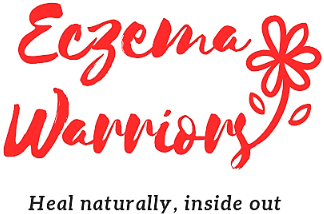
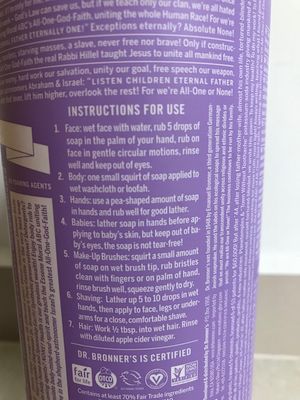
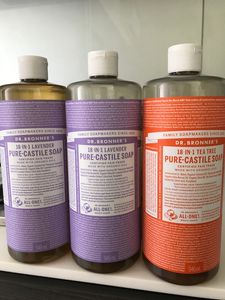
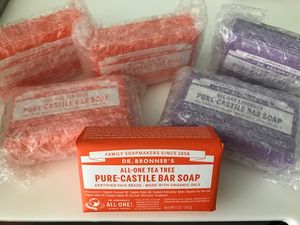
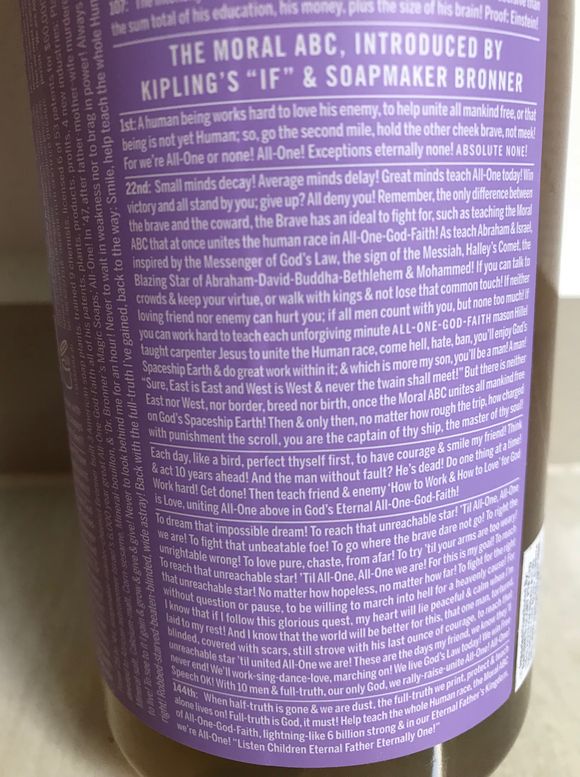
I was looking for an article for eczema relief when I stumbled across yours’. It is probably an understatement but thanks so much for introducing the product and more importantly, the value behind this company. I have to admit I do not know this brand prior to reading your blog but now I am going to find out more and give it a try. Due to our expat lifestyle travelling from city to city, our skins (wife as well) are constantly battling with the changing weather and other creams have provided relief but not permanently… 🙁
Hi Jude,
Yeah I hope more people can learn about this unique company, I really look up to them for the way they carry their values. I also hope you find something to help with your family’s skin issue, it’s not easy to have to adapt to different climate.
I discovered what Eczema was a few years ago and realize a lot of people deals with that. This will be very helpful for a few people I know . I will share this with them.
Hi Steven,
Yes, do share this with people whom you know this article might help. People with eczema are sensitive to what goes into their bodies, both from ingesting and through the skin. So it is important to be mindful of what we use as bodywash, shampoo, and even cleaning products around the house.
Your article on using the right soap for Eczema certainly got my attention because i suffer from the affliction. I have tried different soaps and ointments from my doctor but there is only a temporary relief. I shall look into the Dr Bonner theory a bit more and make a decision.
Hi Andrew,
I’m happy that this article has opened up your soap options by another one. Yes, do research more into it, then you can decide whether it may be the right choice for you. All the best!
I have heard of Dr. Bronner soaps and haven’t ever used them. However, my sister does and swears by Dr. Bronner soap.
However, I do have a question about castile soap. What is special about the soap? I mean why would you want to use it over other soaps? More health benefits, does better, etc. ? I see it in the ingredients for aromatherapy all the time but I don’t understand why people would use castile soap over other soaps? Can you explain it to me?
Hi Garen,
Sure, I’d be happy to point out the differences between Castile soap and other soaps. Castile is actually a historical region in Spain, and that is where Castile soap originates from. The first Castile soaps were made of olive oil. As it evolves, the term Castile soap is now taken to mean any soap made from vegetable oils, as opposed to animal fats. So we see variations in Castile soaps made from coconut oil, jojoba oil, hemp oil, palm oil, and many others. So Castile soap can be seen as soap using vegetable oils as its base. Dr Bronner brings their Castile soap to another level of naturalness and purity, by using only organic oils, with zero chemicals and synthetics.
On the other hand, if not labeled as ‘Castile’, the soap could have animal fats, and now it is even used more generally to include synthetic components in its ingredients.
Oh ok. Good to know. I know a lot of carrier oils are plant based like coconut, jojoba, hemp, almond etc. What are the drawbacks from using animal fats in soap though?
Hi Garen,
As far as I know, soap companies use animal fats especially when mass-producing soap, because it is a very cheap by-product of the meat industry. Also, animal fats tend to harden much better than vegetable oils, so are good in making bar soaps, as it does not turn into a soft lumpy mass once water comes into contact, so it lasts longer. I don’t think there are any serious drawbacks to apply them onto the skin, as after the saponification process involved in soap-making, the animal fats are essentially reduced into fatty acids.
But of course using vegetable oils in soaps, we get the healing properties of the plants used, like hemp, jojoba, coconut, etc.